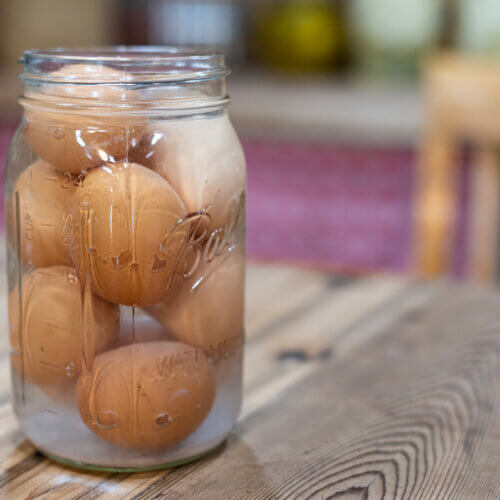
Water Glassing Eggs
Preserving eggs by water glassing is a long-standing historical method that works wonderfully for long-term egg storage. Learn the easy method for water glassing eggs.
Print
Pin
Calories: 70kcal
Cost: Varies
Equipment
- Half-Gallon Mason Jar A half-gallon jar will hold 15-20 eggs. You can use a quart jar for less eggs, or a 5-gallon food-grade bucket if you have more.
Ingredients
- 2 Ounces Hydrated Lime If you can’t find hydrated lime locally, you can find pickling lime here.
- 1/2 Gallon Filtered Water
- 15 Fresh Eggs Make sure they are clean with the bloom still fully intact.
Instructions
- Start off with a clean vessel to store your eggs. Depending on how many eggs you want to preserve will determine the size of your container.
- Gently add your unwashed fresh eggs. (Remember to position them with the pointed side down (the smaller side of the egg).
- Measure out your water and lime. The ratio of water to lime is for every one quart of water you’ll use 1 ounce of lime. No matter what size container you’re using, this is the ratio to follow.
- Add the lime to your clean water and whisk until completely dissolved. The water will look milky white.
- Pour lime water over eggs until they're covered. You can always add more lime water and eggs later on if your vessel isn't full.
- When you’re ready to use your eggs, simply remove them, give them a good rinse and use as normal.
Video
Notes
Storage Instructions:
You don’t need any special storage space, such as a cold storage, root cellar or basement, for this method. Just find the coolest part of your house away from direct sunlight, and you’ll be good to go.
Be conscious of extreme heat and/or freezing temperatures. If you’re storing eggs in a garage, for example, you’ll want to ensure they are stored in a place with pretty steady temperatures.
The biggest concern with water-glassing eggs is evaporation. You don’t want your lime water evaporating and exposing your eggs, especially if you’re storing them in the basement, where you might forget about them, so make sure they are covered.
When ready to use, take the eggs out of the solution, rinse well with water, and use as you would fresh eggs.
Water Glassing Tips:
- Use Clean, Unwashed Eggs – Dirty eggs can lead to bacterial contamination, which can cause the eggs to spoil, even when preserved. I recommend collecting fresh eggs from your chickens and wiping them clean with a dry cloth. Avoid washing the eggs with water as this can remove the protective layer that naturally covers the eggshell.
- Scale as Needed: Scale this recipe up for however many eggs you want to preserve. We usually multiply by eight and use a 5-gallon bucket for a large batch.
- Place Eggs in a Cool, Dark Place – Water-glassed eggs should be stored in a cool environment, away from sunlight and heat sources. A pantry or root cellar is ideal for storing your preserved eggs.
- Store Eggs Upright – When storing water-glassed eggs, keep them upright with the small end facing down. This helps prevent the air pocket from expanding and allows the egg to remain fresh for longer.
- Rotate Your Stock – To ensure the longevity of your water-glassed eggs, it’s essential to use them in a timely manner. Some people like to use multiple smaller jars for this reason, to be able to label the jars with the preservation date and use the oldest eggs first.
- Keep Your Eggs Covered - If your container doesn’t have a lid, add a layer of olive oil over the top of the water, then cover it with a towel to keep any bugs or insects out.
Nutrition
Serving: 1egg | Calories: 70kcal | Carbohydrates: 1g | Protein: 6g | Fat: 5g | Saturated Fat: 1.5g | Cholesterol: 195mg | Sodium: 65mg
Tried this recipe?We want to see! Tag @homesteadingfamily on Instagram.